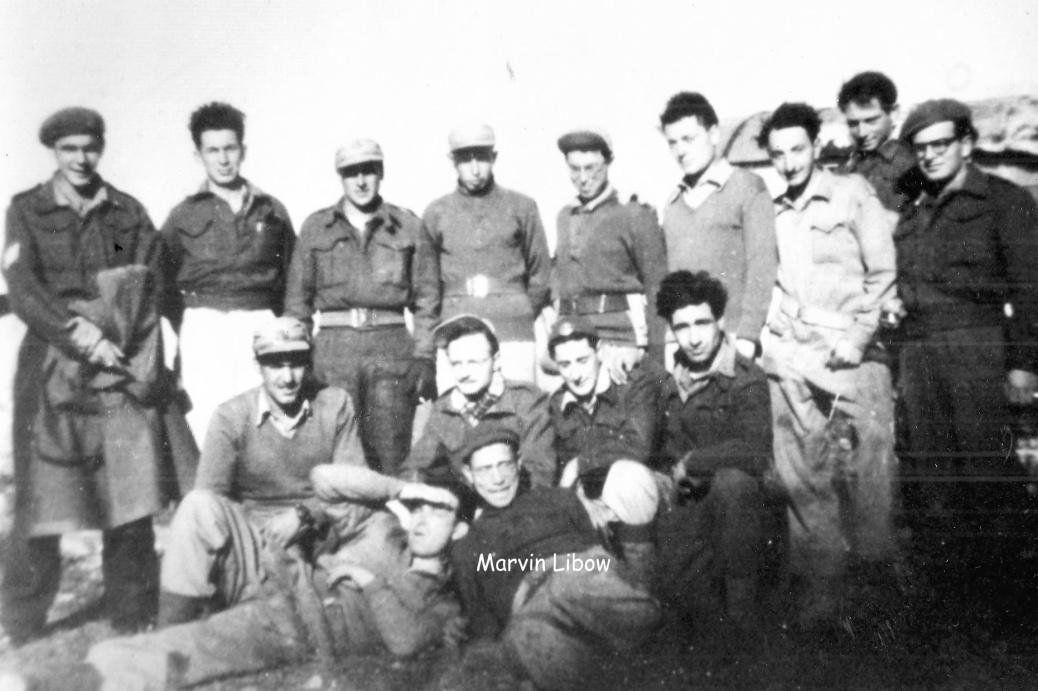I.D.F. NO: 58413

Marvin Libow was born in Los Angeles on July 24th, 1928 and passed away on June 30th, 2010. His father died after an auto accident when he was only one-year-old, and he grew up the youngest of four brothers without a father. His mother took the children to New York City, where she had family, and she needed their help. She worked in the garment district to support herself and her sons.
Marvin grew up in Boro Park, Brooklyn, where he attended the local public schools, Stuyvesant High School and City College. On campus, he became a member of Hillel where he attended a rally sponsored by the Jewish Agency which was covertly recruiting fighters for the emerging Jewish state. He and his friends began collecting arms, including machine guns, which to his surprise were packed in violin cases.
The campus recruiter, a member of the Jewish Brigade in World War II, gave an impassioned speech about Land and Labor for Palestine, the Haganah recruiting office in New York City. Marvin found the address (Breslin Hotel), and volunteered. He obtained a passport and made his way to France in August, 1948. From Le Havre in France, he reached St. Jerome, a displaced persons camp near Marseille. Surviving a difficult voyage on the “Pan York,” he arrived in Haifa on 13th September, 1948. He and the other Americans were told to speak only Yiddish so that the U.N. personnel would think they were refugees. Upon arrival, he found himself immediately inducted into the army. He had been rejected as 4-F by the American army, but if you could breathe, you were in the I.D.F..
He served in the 7th Brigade 72nd Battalion in the English-speaking “B” Company made up of English-speakers, mostly Americans, Canadians, British and South Africans. The Brigade commander, also a Machalnik, was Canadian Ben Dunkelman, and Marvin’s company commander was Norman Schutzman, a Machalnik from the U.S.A.
Arriving on September 13th 1948, after a few days of basic training, he was sent on his way with his unit from Camp Samaria to Safed on September 18th. They were to participate in “Operation Hiram” to clear the entire Galilee right up to the Lebanese border.
Prior to Marvin’s arrival on September 7th/8th, his “B” Company had been involved in a clash with Kaukji’s forces on the Kabul mountain peak, in what was known as the Tamra battle. They suffered three killed and about a dozen wounded. Even as they left Samaria, there were rumors that the United Nations mediator Count Felix Bernadette had been assassinated the previous day, September 17th, by one of the Jewish extremist groups.
Consequently, the operation was postponed, but the company remained in Safed for some weeks. While they were there, Marvin’s platoon had a harrowing experience while returning from a patrol on the approaches to Meron. They came under friendly fire from a group of their sister battalion, the 79th. Luckily they were in a deep valley and the bursts of machine gun fire passed over their heads.
Returning to their base in Samaria, near Nahariya, they all underwent a period of intensive training until October 17th, when another attempt was made to complete “Operation Hiram,” this time from the West. It was again postponed due to the I.D.F.’s successes in “Operation Yoav” in the Negev.
There was more training until October 22nd. Marvin’s No. 2 Platoon acted as support for the No. 1 Platoon which had raided the Arab Liberation Army’s headquarters in the village of Ikrit near the Lebanese border. The attacking platoon suffered one fatality.
Finally, on the night of October 28th/29th, “Operation Hiram” was launched, ending on October 31st, where Marvin’s sabra platoon commander was killed in an action on a Lebanese mountain peak near Malkiya. Marvin’s company had participated in the attacks on Meron, Jish, Sasa, and Malkiya until the objective of clearing the Galilee had been achieved.
At Sasa, Marvin’s platoon had succeeded in ambushing a small convoy of Kaukji’s troops, taking as booty two trucks, one laden with field rations, the other towing a 75-mm artillery piece and loaded with the appropriate ammunition. It was used the next day by Israeli forces attacking Malkiya.
Returning to Samaria, the company was re-organized, absorbing the small other English-speaking group of the 72nd. The enlarged company was now commanded by British non-Jewish Machalnik Derek Bowden, aka David Appel, and they were moved to St. Luke’s camp, just south of Haifa on the main road to Tel Aviv.
There was more intensive training until early December, when they were moved again to Camp Fylon, just outside Rosh Pina, spending a very wet and cold winter in positions facing the Syrians while entrenched at Mishmar Hayarden, during which time heavy fighting was taking place in the south, which pushed the Egyptians across the Sinai border.
At the end of March 1949, Marvin’s final stint of duty was at Kfar Saba, where the remnants of “B” Company prepared for an attack on Kalkiya, cancelled at the last moment for political reasons. Marvin was one of those who had remained until the 72nd was disbanded at the end of April 1949.
He liked to tell the story he had heard of the Machalnik who had stood up under fire on the Kabul peak before Marvin had arrived and said: “A Yid ken du geharget veren.” (A Jew can get killed here.) It was uttered by No. 1 Platoon’s Canadian Hank Meyerowitz, who was much older than the average volunteer, and a great morale booster.
Marvin served as a volunteer in Machal because he felt deeply that there was a need for a Jewish homeland. After fighting for the new Jewish state, Marvin returned to the U.S. He said, “I came home a different guy than when I left.”
Sources: Obituary written by Marvin’s widow Helen in the AVI Newsletter of Spring 2011, and researcher Joe Woolf’s contribution based on his acquaintance with Marvin Libow during the War of Independence.

